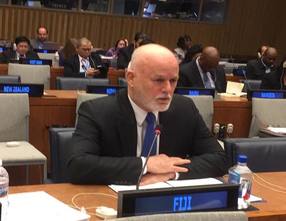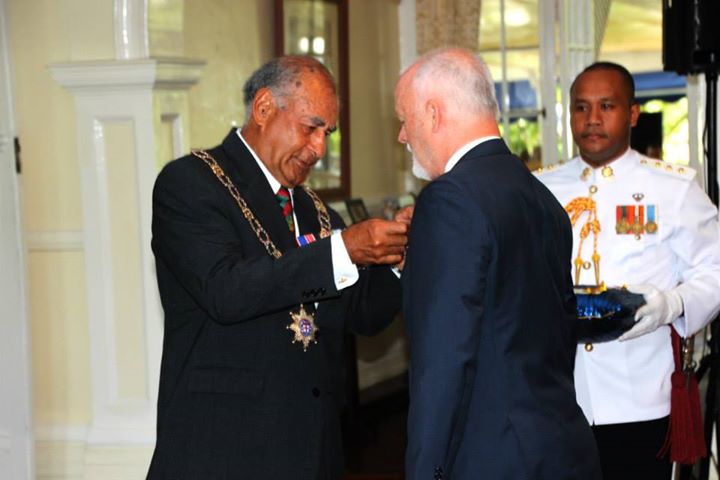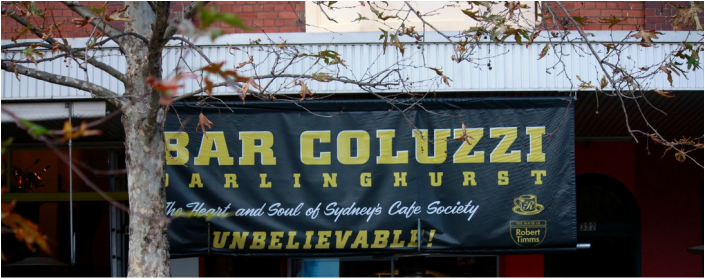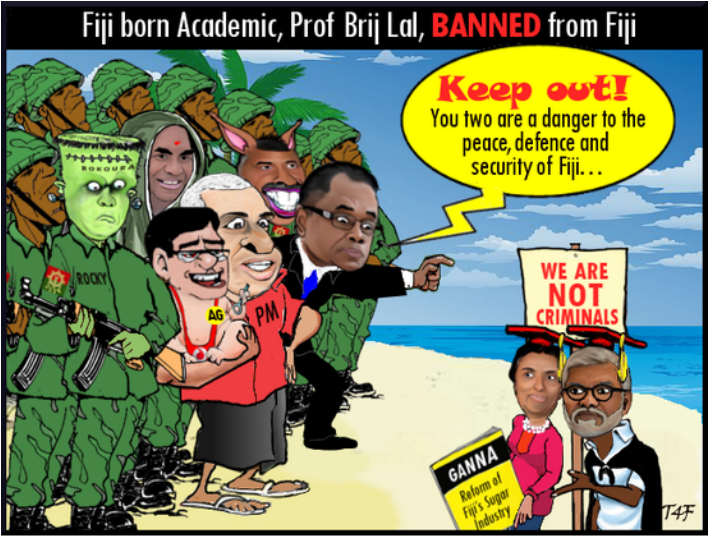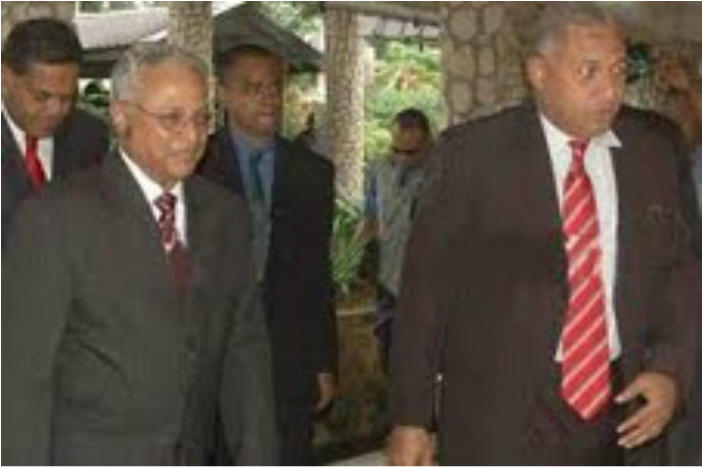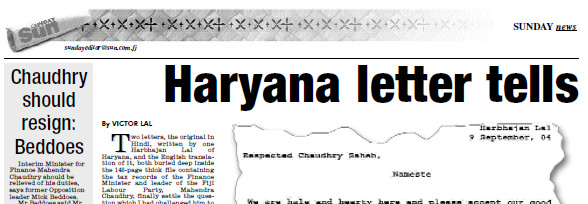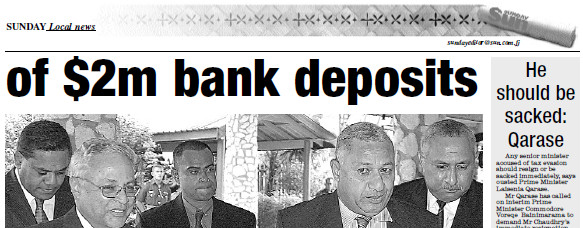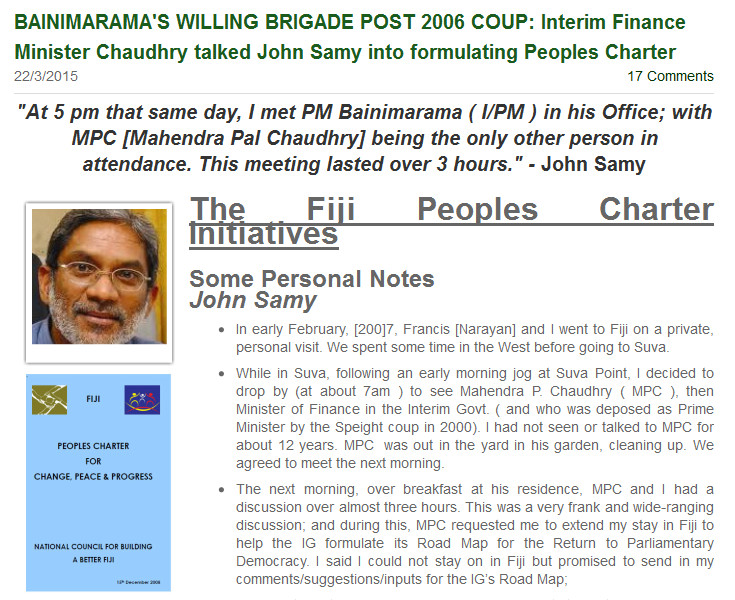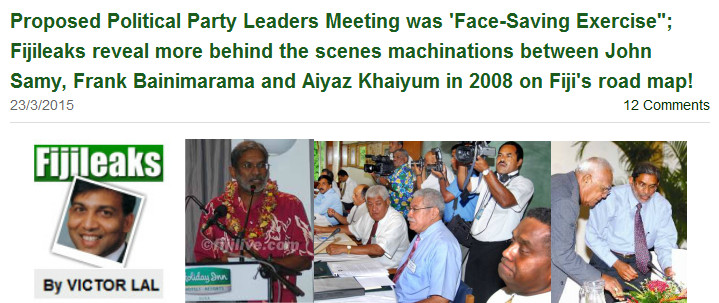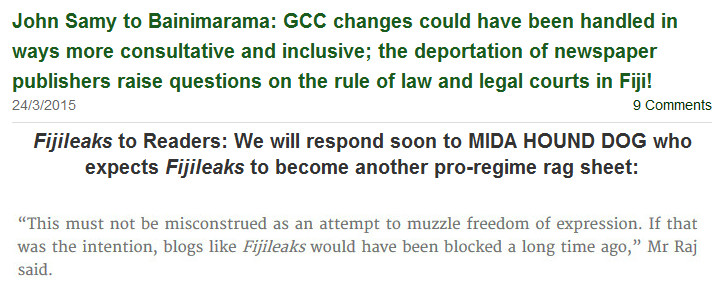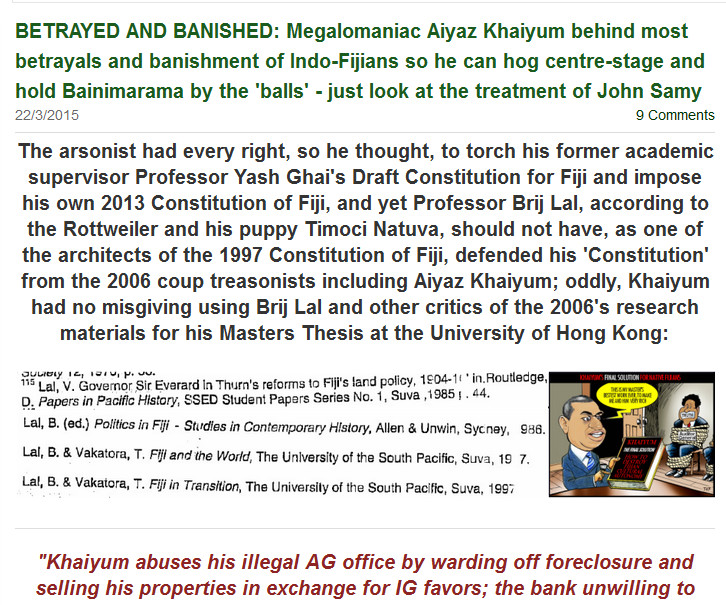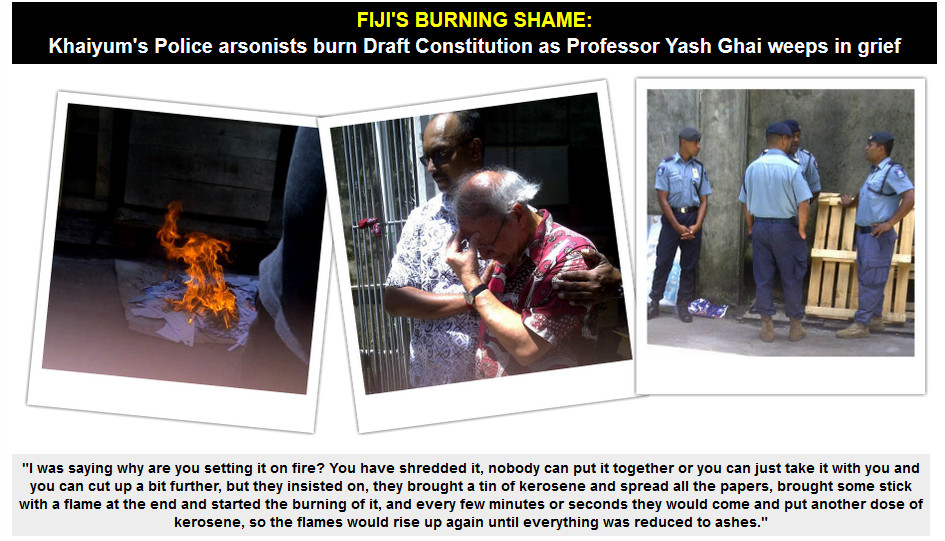The Dual Citizenship Decree has allowed Ambassador Robin Nair to become Permanent Secretary for Foreign Affairs
"Having lost his Fiji citizenship by becoming an Australian and a New Zealander after the 1987 military coup, Thomson regained his original citizenship in 2009, following a Fiji government decree authorising
dual citizenship"; Sadly, Cronies and Critics are meted different treatments under the Dual Citizenship Decree
The election of Fiji's Permanent Representative to the United Nations, Peter Thomson, to be President of the UN General Assembly is a great honour for Fiji.
It is the first time a representative of one of the Pacific Small Island Developing States has been chosen to lead the United Nations General Assembly and it has given Fiji and the other island nations a new and stronger voice in New York.
Mr Thomson’s selection provides us with a unique platform to highlight those issues of critical concern to Fiji and the vulnerable economies, such as building our resilience to climate change and ensuring the sustainable development of our natural resources on land and at sea.
It is a measure of Fiji’s standing in the world that the majority of nations supported our candidacy and I want to warmly thank those countries that voted for Fiji for the confidence they have placed in us.
Our commitment to the United Nations and its ideals has been unwavering ever since we first joined the UN at Independence in 1970. And we have always made a disproportionate contribution to its activities for a country of our size, especially with our strong participation in UN Peacekeeping operations since 1978.
I congratulate Mr Thomson on behalf of every Fijian. I know that he will preside over the deliberations of the United Nations General Assembly with dedication, wisdom and foresight.
J.V Bainimarama
Prime Minister
AT THE COURT OF KING FRANK:
"Six months ago, his excellency the ambassador [Thomson] was a Sydney author and magazine writer, a face in the alfresco coffee crowd at trendy Coluzzi in Darlinghurst...Fiji's UN ambassador is unusual in having triple citizenship: Australia, NZ and now Fiji, his passport restored when the regime ended a 40-year ban on dual citizenship last year...Thomson had been on Bainimarama's radar for 50 years, since his own father had served as a prison warden to Thomson's father in British colonial times. But it was Thomson's strong advocacy of Fiji's position in the past couple of years that persuaded the dictator to entice him back into Fiji government service." Graham Davis, 2010
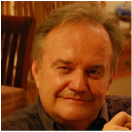
The Australian
22 Juny 2010
While Australia contends Fijian dictator Frank Bainimarama is increasingly friendless, two Australians are among his most loyal supporters
FRANK Bainimarama is bewildered and seething with rage and frustration. The military man in him knows he's suffered a humiliating tactical defeat. And worse, he didn't see it coming.
He's been rolled by someone he thought he could depend on most, the outgoing chairman of the Melanesian Spearhead Group, who has pulled the plug on a summit meeting in Fiji barely a week out and with no warning.
Expensive suites are booked, the pigs, kava and dancers all primed and waiting. It was meant to be Fiji's hour of triumph, chairman Frank briefly wearing the country's former mantle as Pacific leader.
Instead, with his back turned at an International Monetary Fund meeting in South Korea, Australia has mounted a diplomatic counter-offensive, using a $66 million aid package to Vanuatu to strong-arm Prime Minister Edward Natapei into calling the meeting off. Natapei didn't even call Bainimarama to give him the news. So much for Melanesian solidarity. Now back in Suva, the dictator rails against the perfidious Aussies and their Kiwi cousins and the man he accuses of stabbing him in the back.
Yet the military training kicks in, orders are barked, the telecommunications counter-offensive spreads out across the region.
Within days, the MSG Plus summit may be off but the Engaging with Fiji summit is on, attracting a host of Pacific countries, including two crucial face-savers, the leaders of Papua New Guinea and Solomon Islands. It's been a roller-coaster ride of a week at the office, as Bainimarama's chief censor and media strategist Sharon Smith-Johns cheerfully concedes.
"The mood was one of shock, anger and disappointment. Natapei didn't call. He just put out a press release dated Friday that I didn't get until Monday. Suddenly, bang! What do we do? "Obviously, we hit the phones but there were a few prayers too."
With her flame-red hair and assertive persona, Smith-Johns would be a striking presence anywhere. Yet it's still startling to find this former Fairfax marketing executive among the coffee-coloured faces moving quietly in and out of Bainimarama's office, where he sits under a portrait of the Queen deposed by Fiji's first coup maker, Sitiveni Rabuka, 23 years ago.
"I don't think I'm being disloyal to Australia. I feel disappointed with Australia that they can't see what I can see over here, a lot of positive changes. [Foreign Minister] Stephen Smith can take a swipe at us, I can take a swipe at him but my role is giving people a better understanding of what's happening in this country. I don't feel like a traitor, not at all."
Multiple time zones away, by the East River in New York, another Australian citizen, Peter Thomson, is preparing for a diplomatic day of battle for Bainimarama as his permanent representative at the UN.
Six months ago, his excellency the ambassador was a Sydney author and magazine writer, a face in the alfresco coffee crowd at trendy Coluzzi in Darlinghurst.
Now, he's busy signing diplomatic relations for Fiji with a slew of countries it had never bothered to engage before as part of a strategy to broaden its global ties and escape the Australian yoke.
"I've just come back from Cuba," Thomson tells me. "We're examining areas of co-operation in the medical field, in which Cuba is a world leader for developing countries. "We've got 160 medical students from the Pacific on medical scholarships in Cuba."
Unlike Smith-Johns, Thomson is Fiji-born and his connection to the country stretches back five generations on his mother's side.
His father was a British colonial servant and Thomson himself ploughed through the ranks of Fiji's civil service in the stable immediate post-independence years, at one time consul-general in Sydney. But then came Rabuka's 1987 coup, when Thomson found himself a target as the high-profile white permanent secretary to Fiji's governor-general, embroiled in a constitutional crisis and with indigenous supremacists demanding his head.
Three days in an excreta-smeared cell at Rabuka's pleasure convinced Thomson of the need to put down other roots, first in New Zealand, then Australia. More than most, he has cause to have deep personal feelings about the rise of Fijian nationalism and the steady marginalisation, before 2006, of the 40 per cent of non-indigenous citizens.
"I'm a passionate advocate of a multi-racial, multicultural Fiji so I fully support Prime Minister Bainimarama's program," Thomson says. "Race-based constitutions and political parties have been very divisive for the nation. We're now working towards a future in which citizens will vote without regard for race for the first time."
Fiji's UN ambassador is unusual in having triple citizenship: Australia, NZ and now Fiji, his passport restored when the regime ended a 40-year ban on dual citizenship last year.
"To any notion of disloyalty or treachery to Australia, I'd say nonsense," he says. "I'm working to restore good relations in our region, not destroy them."
Unlike Thomson's deep roots in Fiji, Smith-Johns first visited in 1994, then again in 1997 when cupid's arrow sliced through her holiday.
"I fell in love with my diving instructor, the classic holiday romance," she laughs. "Then I moved here in 2000 right in the middle of George Speight's coup. Everyone thought I was mad."
Marrying her diving instructor, Smith-Johns became chief executive of internet service provider Connect Fiji and met Bainimarama informally at a business forum. She wears her devotion on her sleeve.
"I've become good friends with both him and his wife, Mary, who's a wonderful woman and a very close friend of mine," she says. "But he's my boss first and foremost and I have had occasions when he's bawled me out. But although he's tough, he's very fair."
For all her NSW country girl charm, Smith-Johns is now widely detested in Suva as the official who presides over the government's media censorship, the final arbiter of what Fijians see and hear.
She insists that 90 per cent of stories now get past the military censors but that's a figure hotly disputed by her newsroom critics, who also point to her role in what increasingly appears to be the imminent closure of the country's oldest newspaper, The Fiji Times (owned by News Limited, publisher of The Australian).
Most damaging is the allegation that when Smith-Johns was head of Connect Fiji, she allowed the regime to tap into the emails of her customers, including journalists and human rights activists. "Absolute rubbish," she insists. "I take great exception to that. As a CEO, I could not and would not do that. We were never approached by anyone in government to tap emails. Never, ever." Smith-Johns concedes she was once asked to explore the possibility of blocking websites opposed to the regime.
"It was pretty hard-core, nasty stuff but I still said no. I didn't think it was the right thing to do but in any event, it's a losing battle. Block off one website and another will pop up," she says.
Twelve thousand kilometres away from the political blast furnace of Suva, Thomson finds many more friendly faces of all hues as he strides the corridors of the UN.
"While Australia and NZ have obviously caused a lot of damage to Fiji's interests, the vast majority of diplomats I meet are very understanding of our efforts to carry out our reforms and bring long-term stability to the country," he says.
Thomson is spearheading vital elements of Fiji's Look North policy, pursuing closer ties with China, India and the Arab world -- among others -- as a means of breaking free of its dependence on Australia and NZ.
"We've applied for membership of the Non-Aligned Movement to forge a truly independent foreign policy, something we should have done a long time ago," he says.
"Over the last five months, I've officiated at ceremonies formalising diplomatic relations with 17 countries, and there'll be many more before the year is out."
Thomson and his wife Marijcke, a Sydney magazine publisher, were on holiday in NZ in January when the phone rang with Bainimarama's office on the line.
"When your homeland has most need for your services, that is the most important time to serve and I had no doubt that I was equipped to do the job," he says.
Thomson had been on Bainimarama's radar for 50 years, since his own father had served as a prison warden to Thomson's father in British colonial times. But it was Thomson's strong advocacy of Fiji's position in the past couple of years that persuaded the dictator to entice him back into Fiji government service.
"I gave speeches in Australia to the Lowy Institute and the Centre for Independent Studies, as well as speeches in New Zealand, highly critical of their policy towards Fiji. It was pretty strong stuff about punishing Fiji without achieving anything and destabilising the whole region," he says.
Thomson's views were shared by a number of Australian, NZ and Fiji business figures, who secretly commissioned him last year to launch what they called the Fiji Dialogue Project in an attempt to heal the breach.
Thomson is speaking about the initiative for the first time. "These were prominent people with long records of service in the three countries, no personal agendas and a shared commitment to the wellbeing of the South Pacific region. They were as distressed as I was about the breakdown of the relationship," he says.
And so Thomson embarked on a mission of personal diplomacy involving talks in Suva with Bainimarama and his foreign minister and subsequent trips to PNG and NZ.
"I went under the radar to Port Moresby to meet Prime Minister Michael Somare and get his support for our efforts. Good progress was being made when the welcome news came that the foreign ministers of Australia, NZ and Fiji had agreed to a tripartite meeting. We thought, prematurely as it turns out, that our work was done," Thomson says.
There was also a meeting in Tony Abbott's electoral office in Sydney before he became Opposition leader. Thomson says he got a polite hearing but no commitments when he told Abbott the other side to the Fiji story wasn't getting through. Through these efforts, Bainimarama and Thomson developed their high mutual personal regard.
"The PM comes from a background of public service, as did his father before him. Remember, this is a man who only just survived an assassination attempt after he suppressed the ethno-nationalist forces trying to overrun Fiji.
"This is the man who defused the time bomb of the 2000 coup, when George Speight's gunmen held the government hostage for 56 days. That was Fiji's greatest trauma and the country never wants to see it happen again," Thomson says.
Thomson and Smith-Johns say Bainimarama's promise to hold elections in 2014 are central to their support for him and they believe he'll keep his word.
"There will be an election in 2014," says Smith Johns. "No doubt about it."
Bainimarama's many critics aren't so sure and neither is the Australian government, which in any event, wants an election now.
But for these Australian true believers, Bainimarama remains Fiji's best hope and they make no apology for being in the front line defending it against their own government's bete noir.
"I've never had any approaches from the Australian side warning me off," says Smith-Johns.
"No spooks have come to see me. The only warning I received was from my mother, who told me to get back home and stop it! She said, 'For God's sake, Sharon, come back home!' I said, 'It's all going to be OK, Mum. Have a Bex and a good lie down.' And I'm sure it will be."
Fijileaks Editor-in-Chief: We make no apology for not approving many of the vile comments against Graham Davis, whether he is or he is not a friend of Victor Lal, as many of you are accusing him in your unapproved comments. Full stop!

[Mahendra Chaudhry] FEUD:
From Fiji Sun Archive, 2007
By VICTOR LAL
As long as the 1997 Constitution remains in place, the likes of Mahendra Chaudhry, the military, the President, and all those associated with the Interim Government of Commodore Frank Bainimama, will have to tolerate the lecturing and hectoring by one of the co-architects of the Constitution, the Fiji-born and Australian based academic Dr Brij Vilash Lal.
Some of us have fundamental issues with Dr Lal (no relation of mine, except that we share the same surname) on certain aspects of the [1997] Constitution, especially the multi-party concept and the electoral system but those who have taken the oath of office under it will have to swallow the academic doctor’s bitter lecturing pills as long as the Constitution remains the law of the land. And he himself has to engage in constructive criticism and debate on the Constitution.
I have reluctantly stepped into the feud after the present Finance Minister, Mahendra Chaudhry, attacked Dr Lal, and his comments by extension, also apply to me and other academics and regular political commentators on Fiji. Replying to Dr Lal’s article in the media titled “Lal: regime lacks lustre”, Mr Chaudhry claimed the article was essentially a personal attack on him. “Let me state at the outset, that the writer has seriously impaired his academic credibility by continuously spewing venom against me, the Fiji Labour Party and the interim administration without substantiating his claims,” said Mr Chaudhry.
He said Dr Lal’s vindictive attack on him was not surprising, considering his close links with the waning National Federation Party. Here I am reminded of the virulent attacks on me in the media by the previous interim Qarase regime that was formed after Mr Chaudhry was removed from power in 2000. I was consistently accused of peddling pro-Chaudhry and FLP propaganda from London, in my capacity as a member of the Movement for Democracy in Fiji, with Ratu Inoke Kubuabola accusing me: “Victor Lal’s articles all have a simple, indeed, simplistic stance: restore Chaudhry and impose democracy as defined by Lal and his friends.”
Worse, I received a spate of hate e-mails and even death threats from extremists in the Fijian community and anti-Chaudhry Indo-Fijians when, in February 2001, in one of my regular political columns, I wrote that “Chaudhry is a sacrificial lamb at the altar of political opportunism”, and called him a political saint in Fiji politics.
But when I turned my pen against Mr Chaudhry on issues of greater import to Fiji than only those concerning the Indo-Fijians and sugarcane farmers, I also became an object of hatred and derision from his supporters and followers in the FLP, both inside and outside Fiji.
Meanwhile, Mr Chaudhry, while boasting what a marvellous job he is now doing with the economy (merely balancing the books, according to some economists) and the sugar industry, challenged Dr Lal to enter the political arena: “Let him put his money where his mouth is, come down and fight an election here, and make the necessary sacrifices to serve the people of Fiji. Perhaps then he would have won the right to sit in judgment on others.”
He also asked pointedly: “What gives Lal the right to make pronouncements on Fiji from his sanctuary in Australia”.
The answer to Mr Chaudhry’s last question, to put it brutally, is that Dr Lal is one of the co-architects of the Constitution under which Mr Chaudhry became the Prime Minister, fought tooth and nail to enter the multi-party Cabinet, and before the coup also felt that he should be appointed the Leader of the Opposition. Meanwhile, one does not have to prove oneself by standing for elections – elections that Mr Chaudhry claims have been repeatedly rigged since his overthrow in 2000.
In any event, what is the point in fighting elections, when one can, after losing the elections, simply enter Government by hitching a ride on the back of military trucks and guns.
On another serious note, if Dr Lal has no right to open his mouth while “hiding” in Australia, what right did Mr Chaudhry have to release nearly a quarter of a million dollars of taxpayers money to bring down Australian and New Zealand lawyers (with possibly no familial connections with Fiji) from their sanctuaries to fight the Interim Government’s legal case against Qarase in the High Court?
What right did one academic from New Zealand have to come down from his sanctuary to Fiji to carry out an investigation into the 2006 general election? What right did Dr James Anthony have to come down from Hawaii to carry out an inquiry into the Fiji media? Why should the Interim Government go abroad to bring someone from his or her sanctuary to oversee the next general election? Why have we brought lawyers and judges from their sanctuaries to run the courts, the DPP, and the Solicitor-General and Attorney-General’s offices in Fiji?
Who in these two last offices gave the wrong advice to the President on Adi Koila’s appointment to the Boundaries Commission? Above all, what right did Mr Chaudhry have, on his release from George Speight’s clutches, to travel abroad to raise support and money from us to fight his political battles in Fiji? Why didn’t he simply stay put in the country and fight his political battles at home? Why did be waste our time, money, and energy, with many of us making enemies with his political adversaries, when he now says those like Dr Lal (and countless others) should not “poke their noses” in Fiji’s affairs?
If politicians are so against those working in overseas universities, why on earth do they send their own sons and daughters abroad to acquire education, mostly in Australia and New Zealand? It is ridiculous to argue that just because someone is away from Fiji, one has no right to comment on the state of affairs in the country of their birth. We still have homes, friends and families in Fiji. In Dr Lal’s case, he is one of the leading chroniclers of Indo-Fijian history and politics, and he has more to teach them than any Indo-Fijian politician.
If Mr Chaudhry has spent his lifetime fighting for sugarcane farmers and Indo-Fijian rights in Fiji, Dr Lal has equally spent his lifetime interpreting them. It is true that Dr Lal was the former NFP leader Jai Ram Reddy’s nominee on the Fiji Constitutional Review Committee (CRC), to which Mr Chaudhry and his FLP made submissions regarding the new 1997 Constitution.
There is no evidence however to suggest that Mr Chaudhry ever protested against Dr Lal’s presence on the committee, along with Sir Paul Reeves of New Zealand, and Tomasi Rayalu Vakatora, the former Speaker of Parliament.To assist the Commission, two legal counsel were appointed, Alison Quentin Baxter and Jon Apted. The secretary to the Commission was the affable lawyer Walter Rigamoto. Although Mr Chaudhry had reservations, opposing the provincial allocation of Fijian seats, and was unhappy about the electoral arrangements, he signed off the final Joint Parliamentary Select Committee report. When the new 1997 Constitution was unanimously passed by both Houses of Fiji’s Parliament, a jubilant Mr Chaudhry declared after the parliamentary vote that a long-standing grievance about the racist 1990 Constitution had ended.
Two years later he won a landslide election under the very electoral system to which he had grave reservations, prompting Professor Steward Firth of USP to rightly point out that, “Labour was advantaged by the preferential system (Alternate Vote).” Mr Vakatora claimed that the FLP noticed a flaw in the AV used in the 1999 May general elections and used it to win. The FLP saw that the AV system could be used to their advantage since voters had no control over where their votes would end up. They also took advantage of the expertise that was available to them from their Australian counterparts where the AV system is in use in elections.Dr Lal commented after the 1999 elections: “Labour’s unorthodox tactic breached the spirit and intention of the preferential system of voting, where like-minded parties trade preferences among themselves and put those they most disagree with last. Political expediency and cold-blooded ruthlessness triumphed.”
In May 2000, George Speight ended Mr Chaudhry’s political reign, with one of Mr Chaudhry’s own coalition partners from the Fijian Association Party, Ratu Tu’uakitau Cokanauto, after crossing over to Qarase’s Interim regime, said he no longer supported Mr Chaudhry’s leadership because the former Indo-Fijian Prime Minister was directly responsible for the events of 19 May 2000. He said: “Chaudhry has been identified as one of the people directly or indirectly who caused the problem.” The rest is history, with Mr Chaudhry launching one legal challenge after another under the 1997 Constitution to re-insert himself into the corridors of power. In the process, he spared no one, including the President, Commodore Bainimarma and former Prime Minister Qarase over the post 2000 events.
In August 2006, he attacked them for violating the rule of law after the 2000 coup. He accused the President and the Commodore of colluding with Mr Qarase to exclude the FLP from sharing political power. In particular, Mr Chaudhry claimed that “the nation would not be in the present condition were it not for the farce the President enacted in March 2001, when he appointed Ratu Tevita Momedonu as caretaker (puppet) Prime Minister for 24 hours”. Mr Chaudhry also told his fellow Commonwealth parliamentarians: “What took place in Fiji next was a blatant and willful distortion and manipulation of the constitutional and legal system to allow the army-backed regime to continue in office.”
He also berated Ratu Iloilo: “The constitution requires the President to be appointed by the Great Council of Chiefs in consultation with the Prime Minister. In the next questionable move Ratu Josefa Iloilo, placed in office after the coup and who the Appeals Court declared to be in an acting capacity only, convened a meeting of the Great Council of Chiefs, and got himself appointed President.”
What all these events clearly meant, he claimed, was that Fiji’s post-coup authorities had no respect for the rule of law.
To date, Mr Chaudhry has provided no evidence that Ratu Iloilo had himself appointed by the GCC. If we are to believe Mr Chaudhry, is Ratu Illoilo illegally occupying the presidency since the 2000 coup? The President must come out clean before the High Court on his role in the post December coup, to prevent a repeat of Chaudhry-like claims.
There is no point in the Interim administration and the military calling upon us to respect the Presidential Office, when one of its own interim Ministers and a former prime minister had cast grave doubts on its impartiality in a previous coup.
Dr Brij Lal’s only crime is that he is, to quote the late Sir Vijay Singh, Speaking Out, which he should in his capacity as the co-architect of the 1997 Constitution.
And as long as Mr Chaudhry is functioning under the Constitution, he has to listen to (although he does not necessarily have to agree with) Dr Lal’s interpretation of it. He must stop accusing Dr Lal of being an NFP stooge.
What is Mr Chaudhry – a coup stooge?
